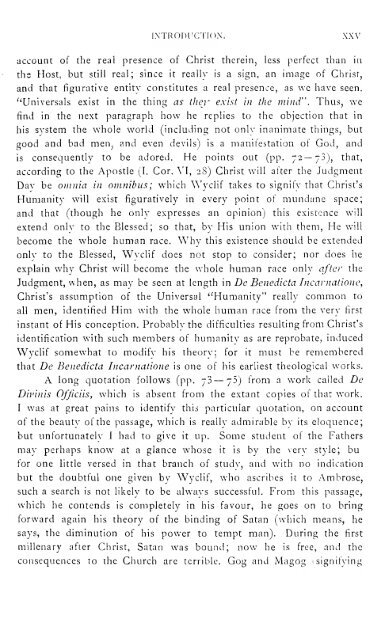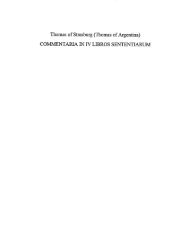Create successful ePaper yourself
Turn your PDF publications into a flip-book with our unique Google optimized e-Paper software.
INTRODUCTION. XXV<br />
account of the real presence of Christ therein, less perfect than in<br />
the Host, but still real; since it really is a sign, an image of Christ,<br />
and that figurative entity constitutes a real presence, as we have seen.<br />
"Universals exist in the thing as they exist in the mind". Thus, we<br />
find in the next paragraph how he replies to the objection that in<br />
his system the whole world (including not only inanimate things, but<br />
good and bad men, and even <strong>de</strong>vils) is a manifestation of God, and<br />
is consequently to be adored. He points out (pp. 72—73), that,<br />
according to the Apostle (I. Cor. VI, 28) Christ will after the Judgment<br />
Day be omnia in omnibus; which Wyclif takes to signifv that Christ's<br />
Humanity will exist figuratively in every point of mundane space;<br />
and that (though he only expresses an opinion) this existence will<br />
extend only to the Blessed; so that, by His union with them, He will<br />
become the whole human race. Why this existence should be exten<strong>de</strong>d<br />
onlv to the Blessed, Wyclif does not stop to consi<strong>de</strong>r; nor does he<br />
explain why Christ will become the whole human race only after the<br />
Judgment, when, as may be seen at length in De Benedicta Incarnatione,<br />
Christ's assumption of the Universal "Humanity" really common to<br />
all men, i<strong>de</strong>ntified Him with the whole human race from the very first<br />
instant of His conception. Probably the difficulties resulting from Christ's<br />
i<strong>de</strong>ntification with such members of humanity as are reprobate, induced<br />
for it must be remembered<br />
Wyclif somewhat to modify his theory;<br />
that De Benedicta Incarnatione is one of his earliest theological works.<br />
A long quotation follows — (pp. 73 75) from a work called De<br />
Divinis Ofjiciis, which is absent from the extant copies of that work.<br />
I was at great pains to i<strong>de</strong>ntify this particular quotation, on account<br />
of the beauty of the passage, which is really admirable by its eloquence;<br />
but unfortunately I had to give it up. Some stu<strong>de</strong>nt of the Fathers<br />
may perhaps know at a glance whose it is by the very style; bu<br />
for one little versed in that branch of study, and with no indication<br />
but the doubtful one given by Wyclif, who ascribes it to Ambrose,<br />
such a search is not likely to be always successful. From this passage,<br />
which he contends is completely in his favour, he goes on to bring<br />
forward again his theory of the binding of Satan (which means, he<br />
says, the diminution of his power to tempt man). During<br />
the first<br />
millenary after Christ, Satan was bound; now he is free, and the<br />
consequences 10 the Church are terrible. Gog and Magog (signifying

















